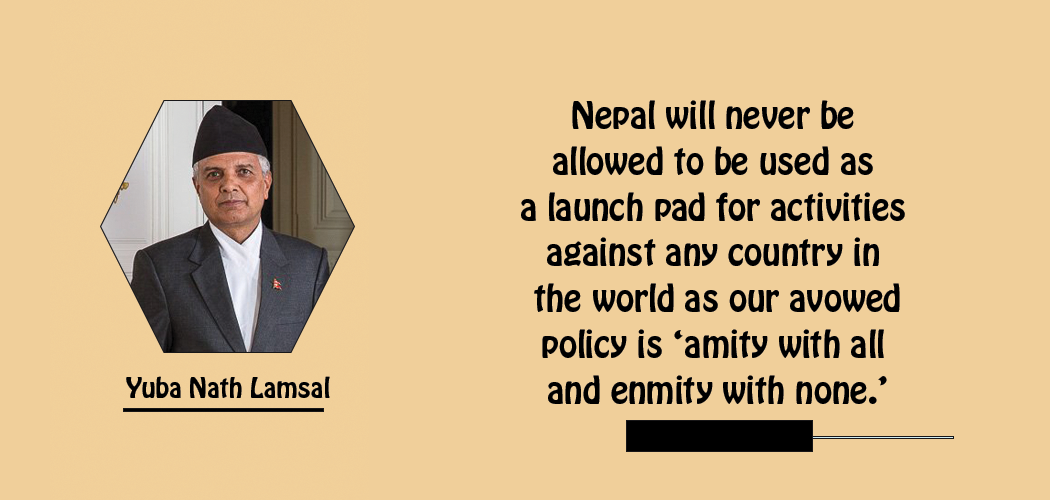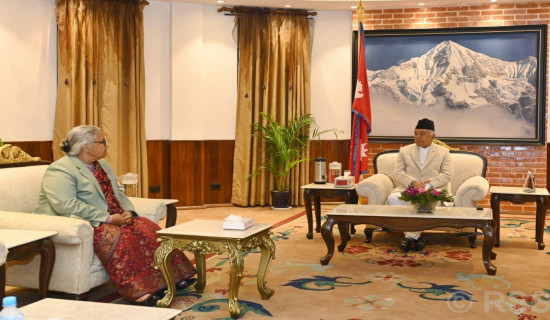- Wednesday, 4 March 2026
Geopolitical Tremors In Nepal
With Indo-Pacific region turning into a major theatre of global power rivalry, Nepal has emerged as a key geopolitical pivot. The flurry of visits by officials from the United States and China over the last few months stipulates Nepal’s centrality in this geopolitical contest. Located between India and China, Nepal’s geopolitical position had always been pivotal in South Asia. It has further ramped up with Asia becoming a key location of geopolitical contention.
Henry Luce, a founder of Time Magazine, first used the phrase ‘The American Century’ in 1941 advocating US role and involvement in the global affairs. The US heavily prevailed in the international power system throughout 20th century. The dawn of the 21st century marked the shift of international power to Asia bringing China and USA face to face. The American Century now appears to be waning and Asian Century is in the making.
China’s rise
China’s phenomenal rise economically, technologically and militarily is an ample sign of a challenge to the global hegemony of the United States marking the end of American superiority. China has already emerged as a global economic giant and all the indications point to the fact that China will be the largest economy in a few years. With economic strength comes political and military ambition for every country. China, too, cannot be an exception.
Superpower is mainly the construct of the Cold War. The term ‘superpower’ was first coined by William Thornton Fox in 1944. In ‘The Super Power’, Fox has analysed the history, nature, role and behaviour of big powers that seek to ensure dominant role and status in international power structure. Big powers always jostle and wrestle to ensure better say and greater role in the international decision-making system. This is inherent nature of international politics. This is what exactly USA and China are doing.
War is a permanent feature in the international power politics. War shapes and alters the status of powers and super powers. In the modern nuclear era, military war between big powers is more proxy than the real one. Big powers often avoid direct military conflict as military war is mutually assured destruction in which no side wins but both lose. Big powers provoke a war in third countries and try to drag the principal adversary into war or wage other forms of soft wars like trade war, technological war, information war and the like.
The war in Ukraine is an illustration of how US succeeded in dragging Moscow into war without Washington’s direct involvement. In this war, both Russia and Ukraine will lose but greater loser will be Moscow. The winner will be the United States as it has not only dragged Russia into war but also succeeded in bringing the rest of European countries into Washington’s fold.
The power structure of the world keeps on changing. The First and Second World Wars bled Britain so badly that it lost the image of global power and was reduced to merely an ordinary European power, whereas the United States emerged as superpower. When US got embroiled in Vietnam War from 1955 to 1975, Soviet Union, out of blue, rose to the status of a superpower challenging the United States. Soviet Union’s collapse in 1991 is linked with two decades of conflict in Afghanistan which exhausted Moscow’s economic strength and military morale leading to lose its super power status.
Afghanistan war from 2001 to 2021 drained America’s resources preoccupying its entire energy and attention at the expense of other geopolitical and strategic theatres. This is the period China rose as economic power accompanied by strategic impulse. The rise of Asia marked by China’s surge changed the dynamics of international balance of power making the Indo-Pacific as the core region of geopolitical contest. The Indo-Pacific region has seen triangular nature of conflict — conflict between India and China, between US and China and between US-India combined and China.
Russia, too, is an actor but its direct and active involvement in the Indo-Pacific region is less likely at the moment because Moscow is already mired in Ukraine war from which it may not come out very soon. The United States is building alliances and making allies in the region under its Indo-Pacific Strategy. The US has some trusted allies in this region like Japan, Australia and South Korea upon which Washington can count in the contest against China. Similarly, the US has built partnership with India to jointly contain and counter Beijing.
However, the US does not fully trust New Delhi because of the Cold War era baggage. India, too, is in dilemma as it wants US partnership to counter China while at the same time it does not want to alienate Russia. The US understands India’s dilemma due to which US-India partnership may not further deepen. But both America and India are under compulsion to work together. The US needs New Delhi because of India’s position in the Indian Ocean and US cannot contain China without India’s cooperation, whereas India alone cannot withstand China’s growing economic, military and technological might without partnership with US.
The United States and China are the principal geopolitical foes. Washington has come up with a new strategy to contain China. Beijing too has its own strategy to counter Washington in the region. The US Indo-Pacific Strategy seeks to deepen cooperation with treaty allies like, Japan, South Korea and Australia, with non-treaty countries like India and with ASEAN members and Pacific Island Forum (PIF) countries. China so far does not have allies in the region. Beijing has closer relations with Pakistan and North Korea. But Islamabad may not afford to antagonise Washington in favour of Beijing. China is creating a network of countries under its Belt and Road Initiative through which Beijing seeks to widen its outreach and check American influence.
Extra caution
Recently Nepal has figured more prominently on the radar of international politics. The tremors of new geopolitical push and pull are already felt in Nepal. This situation demands extra caution on the part of Nepal in handling international affairs and dealing with our two immediate neighbours and the United States more delicately taking into account their genuine and core concerns. Any slight miscalculation and mishandling may land us in trouble. We must ensure that Nepal will never be allowed to be used as a launch pad for activities against any country in the world as our avowed policy is ‘amity with all and enmity with none’.
(The author is former ambassador and former chief editor of this daily. lamsalyubanath@gmail.com)















